April 22, 2015

<p>Photo: Mark Moore</p>
Sprayers have gone high-tech in recent years. Advancements including auto-steer, variable rate application, low-drift nozzles, direct-injection and pulse-width-modulation all have made chemical application more accurate. But there’s a caveat, says Joe Luck, assistant professor in the Department of Biological Systems Engineering, University of Nebraska-Lincoln.
“While we have great technologies to reduce sprayer errors, some boom setup and monitoring--or lack thereof-- issues could contribute to errors that even the technology can’t solve,” Luck says.
He and graduate student Shane Forney found evidence of that while conducting tests of agricultural sprayer performance. They measured the lateral nozzle angle and also looked at issues that come into play with poor nozzle cleaning or substituting incorrect nozzles.
Here’s a closer look at how sprayer performance was measured and some of the sprayer problems you can correct at set-up phase before entering your fields this spring.
You might also like:
Like what you’re reading? Subscribe to Farm Industry News Now e-newsletter to get the latest news and more straight to your inbox twice weekly.
About the Author(s)
You May Also Like




